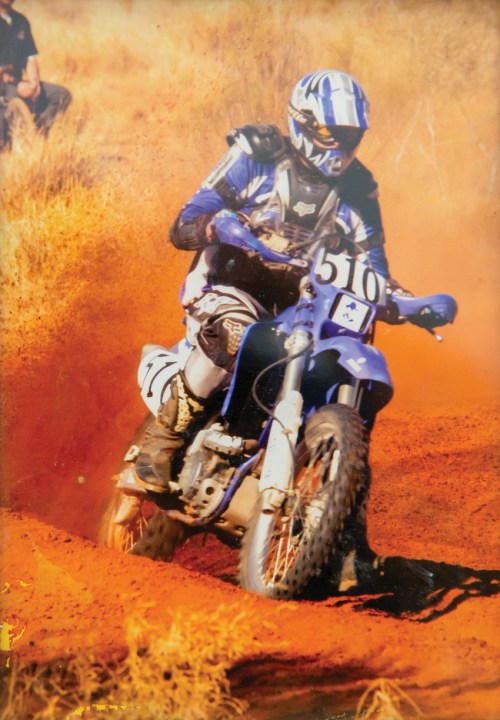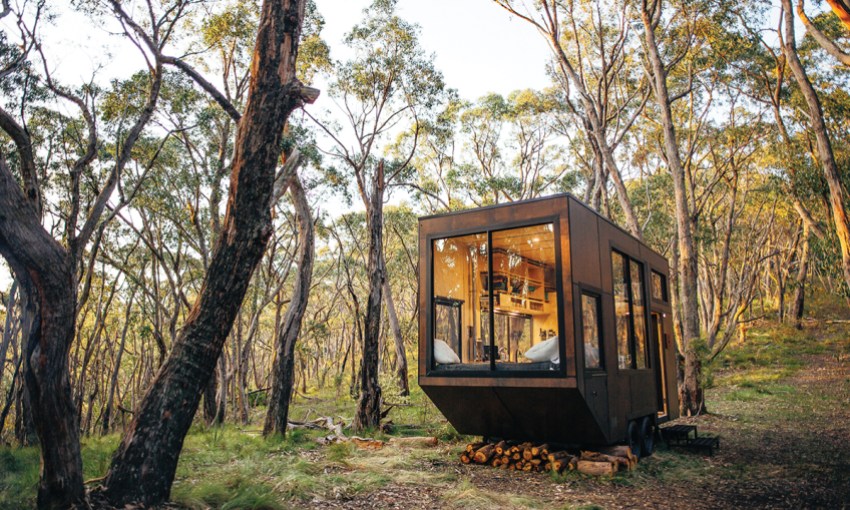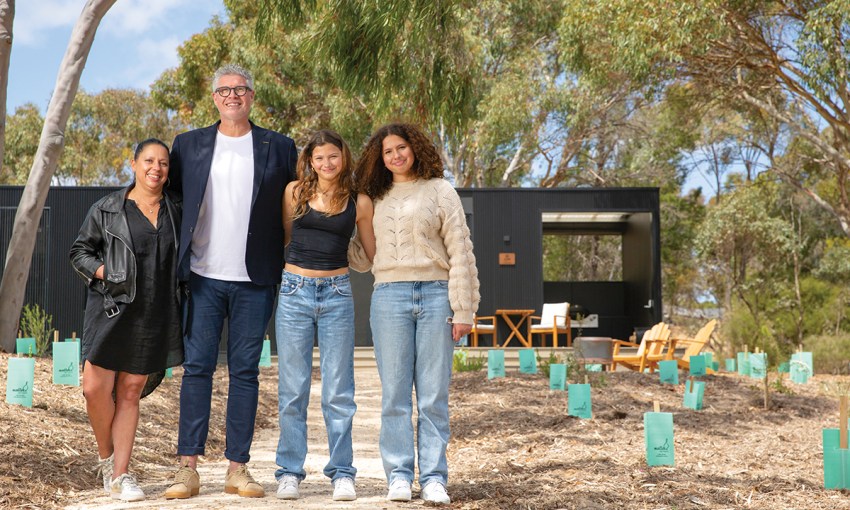Entrepreneur Michael Lamprell was suffering depression and in an unfulfilling career, when he embarked on a transformative journey that led to him establishing CABN, which provides off-grid, sustainable accommodation. Now, he is helping others to re-engage with the most important things in life through these nature escapes, which are having quite a moment.
Out of the woods: How Michael Lamprell created CABN
Michael Lamprell strikes you as the type of person you could share a beer with over a campfire and easily dive into deep topics like spirituality and life purpose. Meeting SALIFE for an interview at a busy Unley cafe, Michael is easily coaxed into introspection.
“We’re all just so busy moving forward, and with commitments and the hustle of life, we actually don’t give ourselves enough time to reflect,” says the 48-year-old father of two. Reflection has been a transformative power over the past decade of Michael’s life, and also drives the ethos behind his off-grid nature escape company, CABN.
CABN’s mission is to help people disconnect from everyday distractions and re-engage with nature and the important people around them, by providing small accommodation spaces, set among a picturesque, remote landscape.
Michael sees it as a solution to the stress of modern urban living, and it was the search for purpose and meaning that saw Michael create CABN, which he says is for himself as much as for anyone else.
As he speaks of his company’s mission, Michael’s passion is evident. And yet, only a decade ago and in his late-30s, Michael was in a hole. The successful entrepreneur had a thriving sales and marketing business that took him all over the world. He’d met his wife Jess in 2002 and they had bought their first family home in Seacliff. It was all perfect. But then, it wasn’t.

“I was really lost and confused. I had a company for 18 years and we did well out of it. There was a time when I loved it, but I became stressed and unhappy to the point where I definitely had depression. If everyone was honest, I think most people would say they have had depression at some point over the journey,” he says.
“It was a consumer-facing business in a world where your possessions contribute to your sense of self-worth. Of course, I still do like and have some possessions, I just place a different value on them now. And I know they don’t directly relate to my long-term happiness.”
Michael grew up in Adelaide, but developed a love of outdoor adventure, riding motorbikes on his parents’ retreat on the Murray, camping and spending time around farms. The call of adventure continued in adulthood – racing dirt bikes, long-distance road cycling and mountain biking, and even racing cars. But there came a point when the thrill of adrenaline served as an escape from his inner distress.
“My parents’ values were all about people and community. I had drifted away from that completely. I was travelling and partying heaps, I was just out of control. I had all these possessions, but I was just getting more and more miserable,” he says.
This was compounded when his dad John, whom Michael considers his best mate, developed a neurological condition that eventually saw him pass away three years ago. It was John who instilled Michael’s love of the outdoors on family camping trips. John had dedicated his life to people and was a 20-year stalwart of the Vinnies Fred’s Van Meal Service.

Michael had one piece of advice that he’d give to younger staff: if you’re not happy with what you’re doing, either learn to love it or leave it.
“I just had an epiphany one day and thought I’d better take some of my own advice. Either embrace it and find a way to fall in love with it again or move on because life is too short. We only have a really short time here. That led me on a journey of self-discovery,” he says.
Michael took part in a meditation retreat on the recommendation of a friend.
“All of our brains are different, and my brain just goes 100 miles an hour. Most of the time, it’s positive and constructive, but it can also go 100 miles-an-hour in a negative direction, worrying about things that don’t exist or haven’t happened yet,” says Michael.
“Meditation was life-changing for me. The course was great, but anyone can meditate. To be able to just clear that noise, it’s like starting your day again. It’s a complete recalibration. People in professional sport are trained to manage those things.”

Michael also discovered the concept of minimalism, one of the principles being: love people and use things, not the other way around. “Relationships and interaction are what matters, things are just things,” he says.
Almost within the same month of his meditation retreat in 2016, Michael tagged along with his good mate, former Adelaide Crows captain Simon Goodwin, to participate in a week-long leadership course at Harvard Business School. The two met in the late 1990s when “Goody” moved in across the road from Michael and they’ve been great mates ever since.
Simon invited Michael and another friend Eddie Taylor on this trip to Harvard, which was followed by another week at Stamford learning from high performance coaches. “That was an amazing experience and I started to have a big recalibration to work out what makes me happy and the values that I had drifted away from,” says Michael.
While at Harvard, news was going around about some young entrepreneurs who had started building wilderness micro cabins aimed at Boston’s stressed-out city dwellers.
“The two guys who started it were Harvard graduates and that’s how I found out about the concept. Everything happened at the right time. I realised that my happy place was, and still is, being in nature and camping. CABN was born after coming back from that trip,” says Michael.

Michael walked away from his career and in 2017 built South Australia’s first completely off-grid, sustainable tiny house, which he named Jude, after his mum. It was one of the first of its kind in Australia. Simon and Eddie came on board as business partners, as did Darren Thomas of Thomas Foods.
“The most luxurious nature experience I’d ever stayed in was a shearing shed; I’m completely happy in a swag by a campfire. Being in nature feeds my soul and I wondered whether that feeling would resonate with others. I wanted to bring that to people from the city. That’s how CABN was born,” says Michael.
“When I reflect, it’s been a gift for me as much as anyone else, mentally and spiritually. I had a business plan, and my gut feel told me that it would resonate with people, but not like it did.”
The main premise of CABN is disconnection – no Wi-Fi and no television; an opportunity to put devices away and reconnect. “It’s about connectivity with each other and nature. No devices: It’s liberating. We’re just too connected,” says Michael.
In the past 12 months, CABN has tripled its footprint and now has 31 cabins across Kangaroo Island, Barossa Valley, Clare and the Fleurieu. CABN has also partnered with Intrepid Travel, which has invested $7.85 million to grow the business. There are plans to double the number of cabins to 70 in as soon as 12 months.

“We were very early adopters of this shift in the way people want to experience nature and the regions. It’s a big leap of faith; it was a risk. We were the first in South Australia and we’ve made some positive impact, which is rare.”
Integral to Michael’s success is his wife Jess, who also works in the business. Jess fully supported Michael in taking a leap with the new venture. “My wife’s absolutely incredible. I walked away from another industry, took a big plunge and I can’t believe that she had faith in me to say: ‘All right, I’ve got you’,” he says. In the beginning, Michael did everything – took bookings over the phone, cleaned the toilet, changed the sheets, made sure there was rainwater and the solar power was working. But even he did not expect the concept would grow as much as it has in just seven years.
Covid supercharged things and it hasn’t slowed down. New projects include an exciting collaboration with the Hans Heysen Foundation at The Cedars in Hahndorf (slated for completion mid-2024) and plans to build 38 cabins along the Cooloola Great Walk on the Sunshine Coast.
“In December, we’ll start work on nine cabins at The Cedars. It’s exciting for us to be able to add value to the Hans Heysen legacy and foundation,” says Michael. The project will collaborate with the Kaurna and Peramangk elders to develop a cultural tourism offering that has “never been done in South Australia”.
“It’s also been incredible to share the journey with the CABN team, in particular to have Shane Laidlaw by my side since almost the start of the journey, who among other things, has looked after all our marketing and has been my righthand man.”


While CABN was one of the first, many other players have entered the off-grid space in recent years. Michael welcomes the activity.
“We embrace the fact that there’s so many more people in the off-grid tourism segment now. It validates what we do. I think it shows that we were onto something. The more people who are doing it properly and are caring for place and nature and the community and the region, the better it is for us and our mission,” he says.
“But if you’re in it just to make a buck, it’ll never work. The back end of what we do can be a grind and it’s hard to make it look easy. If you’re not driven by purpose and passion, I think you’ll fail. We’re doing everything for the right reasons, and it exists because it’s authentic.”
Now taking a big step interstate, Michael is proud to be based in South Australia, a state he believes is often underestimated for its ingenuity. “For a whole lot of factors, things are more challenging to get off the ground here, which means people work harder, they have better strategies and better plans. South Australia is an incredible testing ground. When things work here, it’s a good sign,” he says. Michael still takes his family camping the old-fashioned way, such as pitching a tent in a Flinders Ranges creek bed earlier this year. Some of the family’s best memories have been created in nature, connecting back to Michael’s own childhood camping with his dad.
“One of the biggest gifts we have as human beings is the ability to change. I’m not even the same person I was when I started CABN, my mindset and maturity has shifted again. But my core values have always stayed the same,” he says.
“My whole life has been this massive adventure. I have to remind myself all the time how lucky I am.”
This article first appeared in the December 2023 issue of SALIFE magazine.



